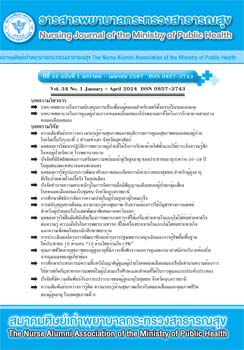The Relationships between Cognitive Abilities, Health Literacy Related to Dementia, and Quality of Life among Older Adults Living in Health Region 6
Main Article Content
Abstract
The quality of life of the elderly is related to various factors and may be different according to the region they live. The purposes of this research were 1) to explore the cognitive impairment situations, health literacy related to dementia, and quality of life among older adults living in health region 6, and 2) to examine the relationships between cognitive abilities, health literacy related to dementia, and quality of life. The participants were composed of 375 older adults purposively selected from those who received health care services at the health-promoting hospitals. The research instruments included the Risk of Dementia Assessment Form, Dementia Health Literacy Questionnaire, and Elderly Quality of Life Questionnaire. Cronbach’s alpha coefficients of them were .99, .92, and .84, respectively. Data were analyzed using descriptive statistics as well as Pearson's correlation coefficients were used to test the correlations among the factors. The results of this study showed that 26.9% of the participants had mild cognitive impairment and 11.7% had dementia. Their health literacy related to dementia mean score was at a moderate level, while their mean score of quality of life score was at a high level. Concerning the correlations, it was found that cognitive abilities had a low positive relationship with health literacy related to dementia as well as with quality of life. Additionally, health literacy related to dementia also had a low positive relationship with elderly quality of life. According to this study, it indicates that in overall, the elderly in Health Region 6 or the Eastern Region of the country have a good quality of life. Nevertheless, approximately one in four elderly people has mild cognitive impairment, and one in 10 has dementia. Such mental impairments may impact on quality of life of the elderly in the future. Thus, for developing effective interventions to promote quality of life of the elderly, health personnel should consider such related factors.
Article Details

This work is licensed under a Creative Commons Attribution-NonCommercial-NoDerivatives 4.0 International License.
บทความและรายงานวิจัยในวารสารพยาบาลกระทรวงสาธารณสุข เป็นความคิดเห็นของ ผู้เขียน มิใช่ของคณะผู้จัดทำ และมิใช่ความรับผิดชอบของสมาคมศิษย์เก่าพยาบาลกระทรวงสาธารณสุข ซึ่งสามารถนำไปอ้างอิงได้
References
Department of Older Persons. Statistics of older adults [internet]. 2022 [cited 1 October 023]. Available from: https://www.dop.go.th/th/know/side/1/1/2387.(in Thai)
World Health Organization. [internet]. 2023 [cited 15 March 2023]. Available from: https://www. who.int/news-room/fact-sheets/detail/dementia.
Tiparat W, Meng-aied S, Suwanweala S, Chuaykaed B. Factors predicting dementia preventive behavior among older adults-at-risk. The Journal of Faculty of Nursing Burapha University 2019;27(1): 100-8.(in Thai)
Pinijsuwan N, Sucamvang K, Nanasilp P. Factor predicting quality of life among caregivers of older persons with dementia. Nursing Journal 2018;45(2):1-13. (in Thai).
Jetwarapong O, Laosee O, Mongkolchati A Determinants of cognitive impairment among adults 50 years and older in Thailand. Interdisciplinary Research Review 2019;14(5):18-24.(in Thai)
Wongarsa P, Chaiyasit Y, Kotta, P, Chanbunlawat, K. Life experiences of older persons with mild cognitive impairment: a qualitative Meta-synthesis. Journal of Thailand Nursing and Midwifery Council 2022;37(2): 30-45.(in Thai)
Page KS, Hayslip B Jr, Wadsworth D, Allen PA Development of a multidimensional measure to examine fear of dementia. Int J Aging Hum Dev. 2019;89(2):187-205. doi: 10.1177/0091415018784737.
Tummakul D, Pumtha-it T. Relationship between health literacy and health behavior of the elderly in Bang Phlat district, Bangkok. Journal of Health Science Research 2021;15(1):106-18.(in Thai)
Paasche-Orlow MK, Wolf MS The causal pathways linking health literacy to health outcomes. Am J Health Behav. 2007 Sep-Oct;31Suppl 1:S19-26. doi: 10.5555/ajhb.2007.31. supp.S19. PMID: 17931132.
World Health Organization. Health Promotion Glossary of Terms [internet]. 2021 [cited 31 July 2022]. Available from: https://iris.who.int/bitstream/handle/10665/350161/9789240038349-eng.pdf? sequence=1.(in Thai)
Nutbeam D. The evolving concept of health literacy. Social Science & Medicine 2008;67: 2072-8.
Nutbeam D. Defining and measuring health literacy: What can we learn from literacy studies?. International Journal of Public Health 2009;54(10):303-5.
Duangjina, T. Nursing Care for older persons with mild cognitive impairment: Application of the self-determination theory. Journal of Thailand Nursing and Midwifery Council. 2022; 37(1): 5-18. (in Thai)
Siddiqui M, Nyahoda T, Traber C, Elliott S, Wang V, Toledo-Franco L, Rodin MB. Screening for cognitive impairment in primary care: rationale and tools. Missouri Medicine. 2023; 120(6):431-9.
Grace S, Horstmanshof L. A realist evaluation of a regional dementia health oroject. Health Expectations 2019;22:426-434. doi: 10.1111/hex.12862
Sukamolsun S. Effect size: Practical significance in research. Pasaa Paritat Journal 2010; 25:26-38.
Thongtanunam Y, Rungsawang Y, Chaiarsa P, Rodpipat S, Wanwaisart P, Nusawat J, Jittawisuttiwong R. The development model of case management for disable seniors in community: A case study of urban communities in Nonthaburi municipality. Journal of Health Science Researchb 2018;12 (Supplement):61-73.(in Thai)
Phongphanngam S, Helen WL. Cross-cultural instrument translation and adaptation: challenges and Strategies. Pacific Rim Int J Nurs Res, 2019;23(2):170-9.
Undara W, Singkasenee U, Wongnitikul P. The study of dementia, knowledge and prevention of dementia and the demographic data in the Elderly Association of Royal Thai Air Force Nursing College. JOPN 2016;3(1):23-35.(in Thai)
Zhang H, Loi SM, Zhou S, Zhao M, Lv X, Wang J, Wang X, Lautenschlager N, Yu X and Wang H. Dementia literacy among community-dwelling older adults in urban China: a cross-sectional study. Frontiers in Public Health 2017; 5:124. doi: 10.3389/fpubh.2017.00124.
Suka M, Odajima T, Okamoto M, Sumitani M, Igarashi A, Ishikawa H, et al. Relationship between health literacy, health information access, health behavior, and health status in Japanese people. Patient Education and Counseling 2015;98: 660-8.
Aihara Y, Maeda K. Dementia literacy and willingness to dementia screening. Int. J. Environ. Res. Public Health 2020;17: 8134. doi:10.3390/ijerph17218134.
Srithanee K. Relationship between health literacy and quality of the elderly’s life at the central part of the North-East Thailand. Journal of Health Systems Research 2017;11(1):26-36. (in Thai)

